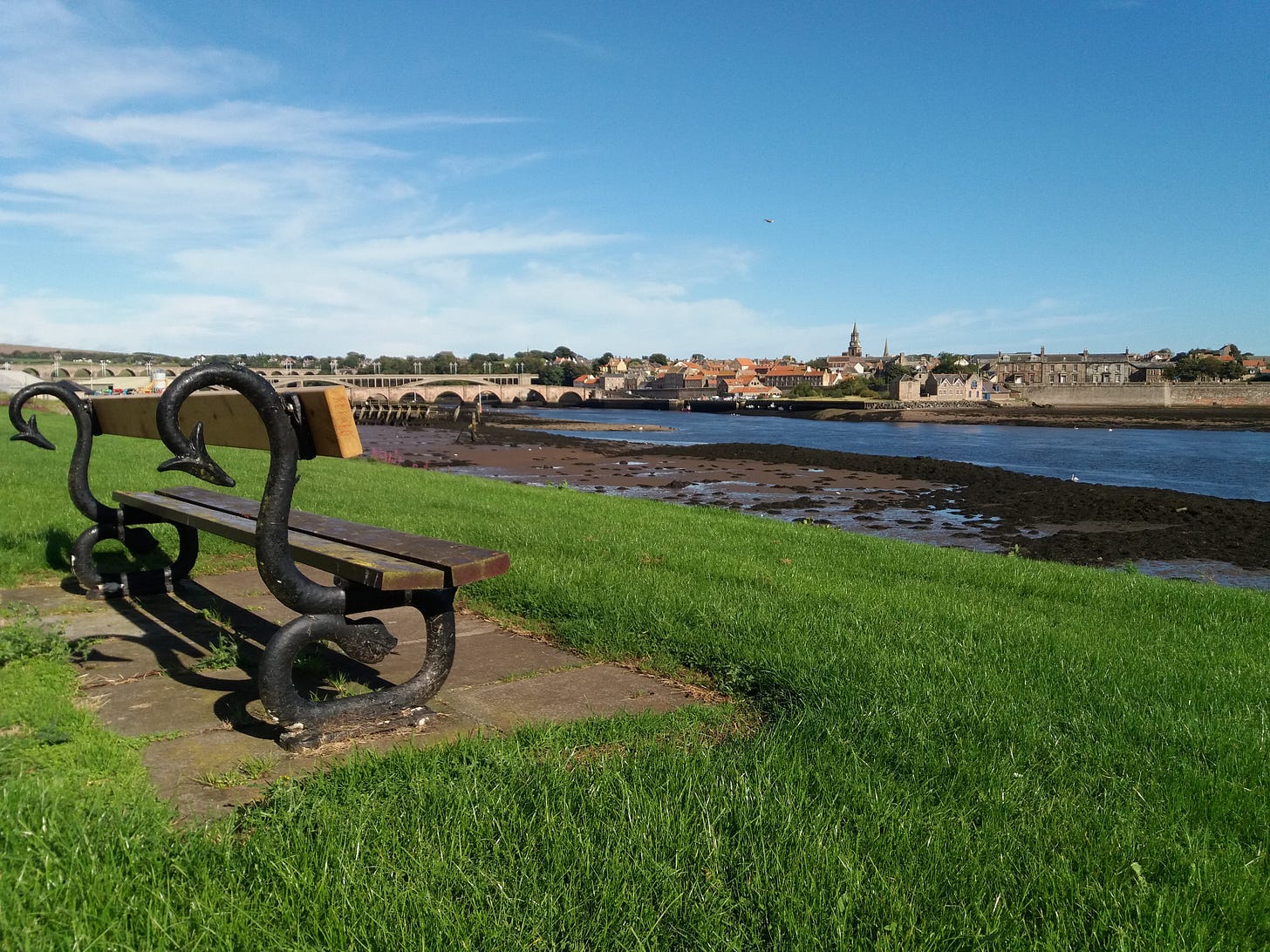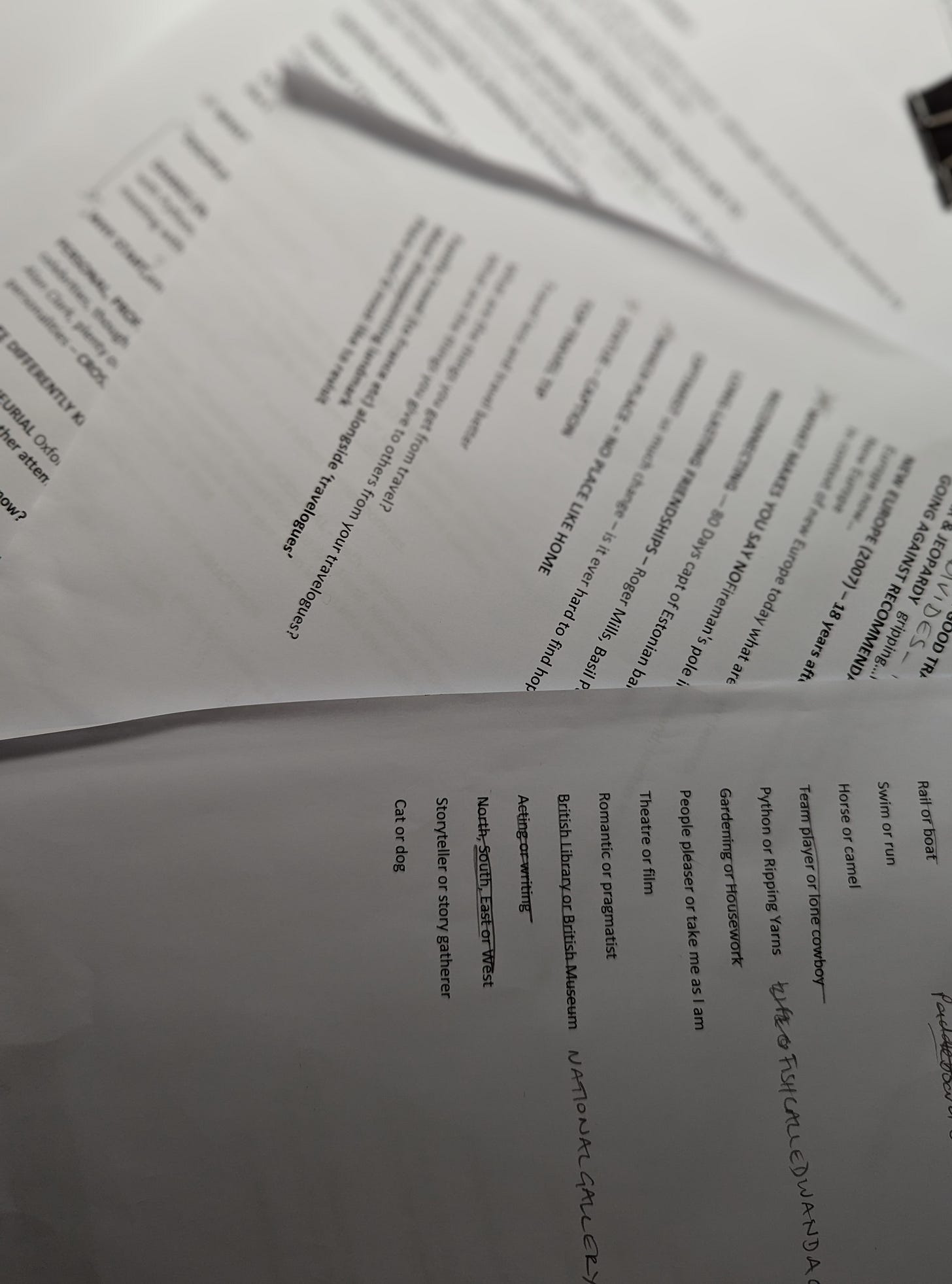In conversation with Michael Palin (take two)
Interview as performance: now for something not quite completely different
Thanks for the feedback and responses on last week’s post about my two conversations with Michael Palin. It’s been fun revisiting the weekend and reprocessing and reordering how I prepare and approach interviews. And, as ever, it’s brilliant to hear that my experiences chime with so many other people.
I particularly enjoyed a note I received from
. Turns out that she, like me, is a random note scribbler - menus, loo paper (not used!), napkins, till receipts, you name it. It’s such a relief, when you hear that you’re not alone in what feels like a ‘bad’ habit, don’t you think? I wish I was that person who underlined headings with a ruler in a neat journal and colour-coded thematic sections with a highlighter. But I’m not.Sometimes, when I do (very occasionally) start off in that beautiful ordered way, I completely forget that I’ve done it. It’s months down the line (usually after whichever event I was preparing for is over) that I stumble on my pristine first page of notes and realise that I was more organised than I thought - which I suppose means I wasn’t!
Well, enough rabbiting on. Here are a few more thoughts that my conversations with Michael Palin (and others) generated.
A glance at my trusty clipboard while MP celebrates the wonderful audience.
Know the brief
This links to a point in my previous post (‘mental preparation’). As I said, the gig with Michael Palin was billed ‘entertainment’, and that’s very different to a political interview. I’m not looking to dart at a reluctant politician with a killer question about why they’ve failed to deliver on election promises; I’m looking to develop the rapport, warmth and openness that lead to interesting and illuminating anecdotes and insights.
Michael Palin’s gigs at the Maltings were also trailed as ‘part of the Berwick Bridge 400 celebrations’. As most people living in Berwick know, 2024 is the 400th anniversary of the completion of ‘the Old Bridge’, commissioned by James I (James VI of Scotland). The bridge is a physical underscoring of the Union of the Crowns (1603) and it’s stood the test of time.
Berwick’s three bridges with the Old Bridge at the fore
Clearly, Michael Palin’s crossed a few physical and metaphorical bridges in his time. I hoped he’d share some thoughts on crossing international and cultural boundaries and the ways that comedy and creativity might help build bridges in a fractured world. However, I’d also done enough research to know that I had to tread carefully. Michael is wary of expressing unequivocal political opinions or judgements - part of his appeal is, after all, that he travels with open heart and eyes, setting things out for us to draw our own conclusions. His agent had also been clear in the build up to the interview that Michael wanted to keep things fairly light.
In the end, I’m not sure I fully got there with this topic. We maybe tackled it a little more effectively in our second Saturday afternoon conversation. I was more direct (prompted by the the Literary Festival Director) in my questioning and took the precaution of discussing the idea with Michael in the dressing room pre-show. There are always questions or subjects that feel elusive or difficult to articulate in the moment. It’s the nature of the beast. You do your best and move on.
Questions & notes on stage
Zoom interviews have a lot to answer for in terms of discreet access to full length written notes. A split screen, a careful scroll and glance and it’s not too obvious to the interviewee or the audience that you’re leaning almost verbatim on your copious notes.
However, at a live gig, that won’t wash. As you’ll see from the snap above, I’m a clipboard gal. I know interviewers who definitely don’t approve and some even see it as a weakness. It was definitely on my mind as a potential awkwardness - I even asked Michael if he minded me bringing it on stage! He didn’t. In fact, it became a bit of a running gag between us. He joked that he knew I was going to throw some new twist at him when I glanced at my clipboard. My feeling is that I need to feel comfortable and confident and my clipboard prop enables that, so much the better.
I often map out full questions and then distill them into broad topic areas with one-word notes on specifics - particularly names and dates which are so easy to forget in the heat of the moment. I also try to follow a ‘heavy’ topic with something lighter.
A snap of my clipboard notes: scribbles essential… Particularly for the quickfire round (different questions each show)
Beginnings & ends
I write my introduction and sign off in full. Always. Knowing exactly what I’m going to say at the very beginning - and getting all the acknowledgements right - sets the pace and tone of the whole session. The end is rather more flexible. A sign off can occur to you as you’re chatting. But it’s good to end on a high and that’s why having something in mind, in case inspiration doesn’t come, is a godsend.
Time keeping
In the library, with a small audience, glancing at your watch and explaining you’re keeping an eye on the time isn’t so very bad. However, in front of an audience of 300, in a theatre, that’s not so cool. I don’t know why, it just isn’t. But you do need to keep a handle on the time - there’s scheduling the Q&A to consider as well as pacing the conversation effectively. I chatted with Jimmy the sound guy at the Maltings and he positioned a clock on the footlights that I could glance at. Perfect. Thanks Jimmy.
NOTE: On day two, I totally lost track of time in the first half - I think I relaxed too much! We managed to bring it back, and Michael was okay with overrunning - he was enjoying himself. However, generally speaking, I think it’s a courtesy to guest and audience (and theatre staff) to stick to timings as much as possible.
Body language and audience vibe
A lot of people have asked if I knew Michael before the interviews. I didn’t. We had a brief telephone conversation a week before the events. We also had the opportunity to chat merrily in the dressing room for quite a while before the shows. All very relaxed.
However, when we settled on stage for the first show, I noticed that Michael’s body language was pretty closed: he folded his arms and crossed his leg away from me. He wasn’t quite as fulsome in his replies as I’d anticipated from our pre-show chats. Fortunately, all my prep meant that I had plenty of material and space to explore topics that would reassure him of my intentions.
I think he’s used to people getting smart with him, or slipping in a question designed to expose him in some way. So, despite the ‘work’ in the dressing room, I had to win his trust on stage. Getting the audience on side is vital to this - they are such an integral part of any show - and you need to let them know that they are important and essential to what’s happening on stage, without encouraging a free for all.
Early in the first session, we talked about music in the context of crossing cultural divides. Michael referred to an instrument but he just couldn’t remember its name; I was clueless. I could feel the answer bubbling in the audience and was considering asking them when it could be contained no longer: ‘kora!’ several people called out simultaneously. It was wonderful.
The audiences were fabulous - ready to love Michael and have a good time: attentive, warm, engaged. Of course, for me, a Berwick audience is a home audience. I knew many people at both shows and that was enormously comforting. People were rooting for me too.
Know your place
I’ve talked about the role of an interviewer above and in previous posts. But there are a couple of quite specific points to make here - gleaned from past experiences.
Firstly, a bit like editing out all the research you’ve done for a book so that it doesn’t ‘show’, you need to make space for your guest to tell you about themself. It’s so tempting to show off your knowledge and how much work you’ve done. But resist it with all your might (although, sometimes you may have to lend a helping hand - see below). Everyone’s come to hear your guest.
Of course, your research is never wasted, you don’t need to showcase it: it will shine through in your questions, your response to your interviewee’s answers and in your demeanour.
The questions from the audience at the end of the sessions with Michael Palin were great. One, asked him to outline his most challenging/daredevil experience (I’ve totally paraphrased - it was put way more interestingly than that). After a nod and ‘good question’, Michael turned to me and said: ‘Can you just talk while I think about that?’ My stomach slid. Just talk??? About what??? Then I remembered reading an article he’d written about an extraordinary kayak journey to the Pongo de Mainique in Peru and we were away.
Secondly, don’t get carried away with your own performance skills/wit/intellectual credentials. When you’re in the company of someone who’s funny/intelligent/articulate/a consummate performer and it feels like you’re both having fun, it’s easy to try to match them joke for joke or highbrow insight for highbrow insight. Trust me, it will most likely turn the conversation into a sparring match which isn’t much fun for the audience. Worse than that, the interviewee will probably either put you firmly in your place in some rather uncomfortable way, or you will look very try-hard. Or both. Do I speak from experience? Yes. Yes, I do.
It’s a comedian’s job to outsmart hecklers or pick-me-ers with a hilarious put-down or riposte that’s impossible to come back from. I had that experience once on BBC Radio Newcastle with comedian Ed Byrne. Never again.
Pick me! With Michael Palin. I won’t tell you what The Husband said when he saw this photo.
Till next time









